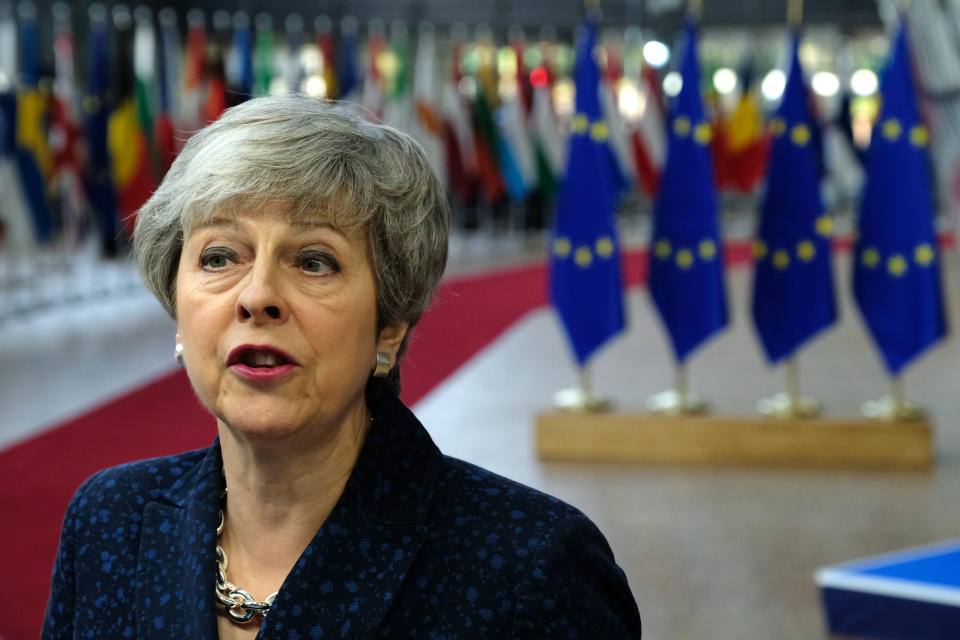Businesses, unions unite to plead with May to stop the Brexit madness

The UK’s top business organisation has united with Britain’s leading union body to ask prime minister Theresa May to change her damaging Brexit approach. And they want an in-person meeting with her too.
“Our country is facing a national emergency,” said the leaders from the Confederation of British Industry (CBI) and the Trades Union Congress (TUC) in a public letter to May. “We cannot overstate the gravity of this crisis for firms and working people.”
The letter – which includes a three-point plan for May – was released as the prime minister meets with European Union leaders at a summit in Brussels to request a short Brexit extension.
The UK parliament recently voted to support a Brexit extension beyond the 29 March deadline, but a delay is not guaranteed. All 27 EU leaders must agree to an extension.
“Decisions of recent days have caused the risk of [a] no-deal [Brexit] to soar,” warned the TUC’s general secretary Frances O’Grady and CBI director-general Carolyn Fairbairn.
“Firms and communities across the UK are not ready for this outcome. The shock to our economy would be felt by generations to come.”
O’Grady and Fairbairn outlined their step-by-step plan:
Avoid a no-deal Brexit
Secure an extension to the divorce deadline
Provide a “Plan B” that goes beyond the “deal or no-deal” threat
READ MORE: Britain pioneers new way to help warn about economic shocks
“A Plan B must be found – one that protects workers, the economy and an open Irish border, commands a parliamentary majority, and is negotiable with the EU,” they said.
The prime minister has walked us into a national emergency. @The_TUC and @CBItweets agree – she needs to urgently change her Brexit approach and find a Plan B that protects jobs, rights and livelihoods. pic.twitter.com/qaIpQppLst
— Frances O'Grady (@FrancesOGrady) March 21, 2019
The TUC represents about 5.5 million workers in Britain who are members of dozens of different unions. The CBI represents 190,000 businesses across the country, which employ nearly 7 million people in total.
The two organisations rarely unite to make joint statements, but have come together a few times to warn about the risks associated with Brexit.
Are businesses ready for Brexit?
The stark warnings from the CBI and TUC came out as the Bank of England published a new business survey indicating that more companies are feeling prepared for a potential no-deal Brexit.
The March survey showed about 80% of companies considered themselves to be ready for a no-deal scenario, up from 50% in January.
“Nevertheless, many companies reported that there were limits to the degree of readiness that was feasible in the face of the range of possible outcomes,” the central bank said, noting that issues like tariffs and border slowdowns were out of the control of businesses.
But even those business leaders that felt prepared still expected output, employment and investment to be weaker under a no-deal scenario versus a situation where the UK and EU signed a formalised deal.
What is a no-deal Brexit?
At its most basic level, a no-deal Brexit would see the UK leave the EU without any new formalised arrangements covering crucial issues including trade, migration, border control and even flights across the English channel. This would lead to a so-called “cliff edge” for businesses, which would struggle to adapt to a new trading environment with the EU and other countries.
In a no-deal scenario, the UK is expected to revert to World Trade Organization (WTO) trading rules, leading to a flurry of new customs checks, paperwork and tariffs at the borders, slowing down imports and exports of items including car parts, fresh food and smartphones.
The UK would also be ejected from the EU’s previously agreed free trade deals and treaties with outside nations, including the newly minted trade deals with Canada and Japan.
Many consider this to be a worst-case scenario. The Bank of England warned in late 2018 that the UK economy could shrink by about 8% within a year if there’s no deal and no transition period. That fall would be the worst the country has seen in roughly 100 years. The pound would crash, inflation would spike and house prices could drop by about one-third.

 Yahoo Finance
Yahoo Finance 